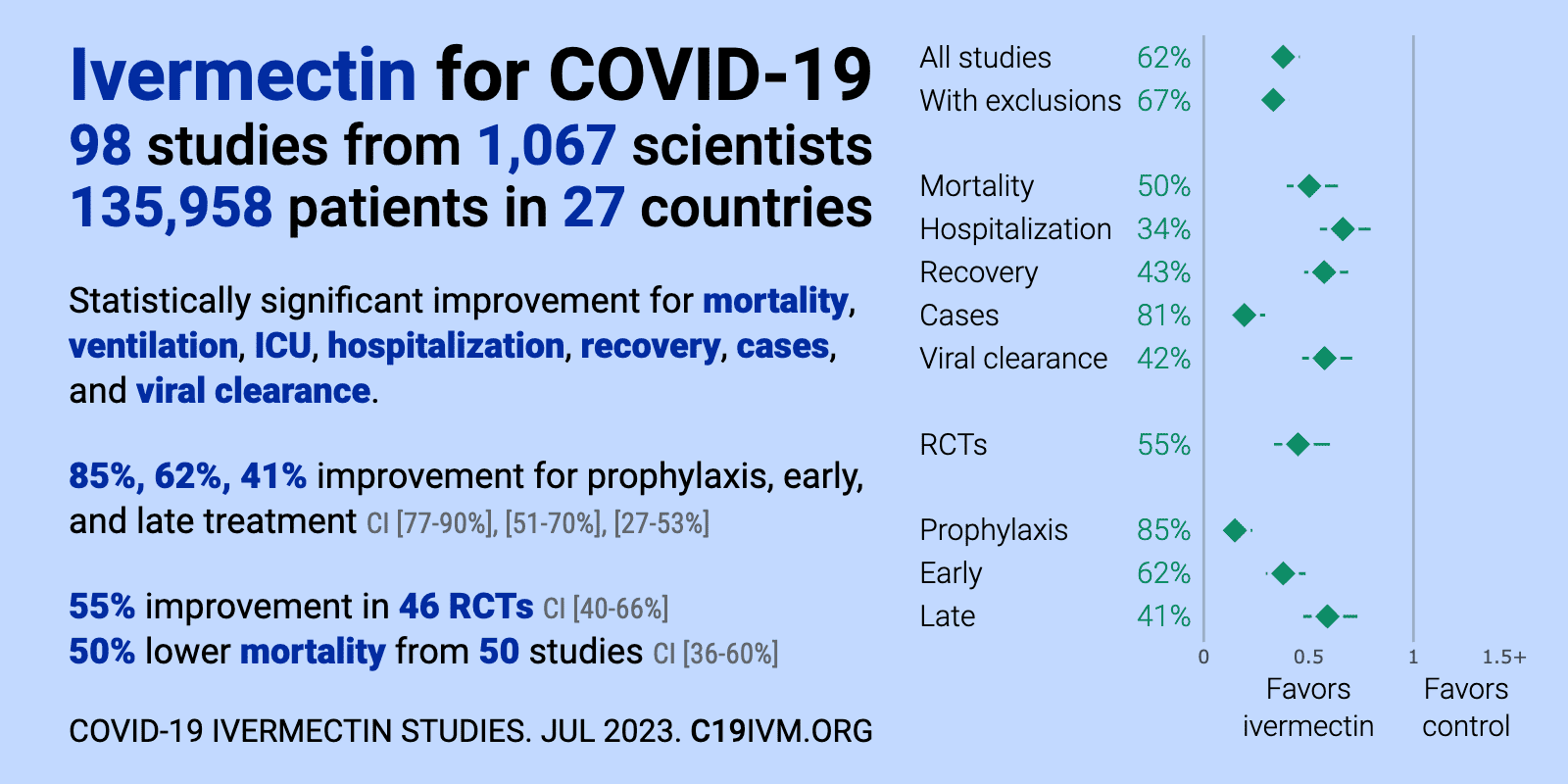Thanks to Christopher Cook (former executive editor of The Western Free Press) from The Freedom Scale.
If you’ve been paying attention—and if you’re reading this, then chances are you have been!—you know that ivermectin is effective against covid. You know that ivermectin has been maligned, lied about, and mocked by the mainstream narrative-creation machine. You know that orders came down from the top, and then spread down through the entire medical-pharmaceutical establishment, to make ivermectin nearly impossible to get. The government has even gone so far as to confiscate shipments that people have ordered from overseas.
You may have also read some of the many studies and data that demonstrate ivermectin’s effectiveness. You know about Uttar Pradesh and other states in India. You know about the lower severe-covid rates in Africa—where they eat ivermectin like candy because of the parasites there.
You also likely know that it is extremely safe, with few side effects; that it garnered a Nobel Prize; and that it has been administered several billion times worldwide since its advent.
That said, you may or may not have seen ivermectin work with your own eyes. Facts tell, but stories sell, and seeing it save someone is powerful stuff. So I am going to share one such story about which I have direct personal knowledge, and whose details I can confirm are 100% accurate.
First, some background…
For an as-yet-unknown reason, this patient appears to be more susceptible to severe covid symptoms. Patient had a strong reaction to Alpha in 2020 and severe symptoms, hospitalization, and multi-month recovery from Delta in the second half of 2021. (One hypothesis for this heightened susceptibility involves overactive immune response, but no dispositive determinations have been made.) Fever in 2021 was over 103˚ for 7 days; patient’s history thus gave strong reason for concern as soon as high fever began to manifest with this most recent infection.
And yet, read the details below and observe the rapid recovery as soon as ivermectin was administered:
Saturday:
Patient complained of upper respiratory symptoms culminating in high fever.
Sunday:
Fever reached 102.6 before administering fever-reducing medication (ibuprofen, acetaminophen). Fatigue, upper-respiratory symptoms strong. Covid test negative.
Monday:
Covid test in AM positive. Ivermectin administered mid-morning (0.6mg/kg). Fever reached 102.8 before administering fever-reducing medication. Fatigue, cough, fog, sputum production all severe. Heart rate elevated. Daytime SpO2 low-mid 90s. Covid test repeated to confirm; still positive. Fever-reducing medication taken before sleep (10PM).
Tuesday:
7 AM wakeup, no fever. Ivermectin administered (same dosage). Daytime SpO2 low-mid 90s. Took until 2pm for fever to slowly climb to 100.8. Fever-reducing medication administered. Fatigue, cough, fog, sputum production, heart rate all improved.
Wednesday:
7 AM wakeup, temperature normal. Ivermectin administered (same dosage). Temperature remained normal all day. Daytime SpO2 low-mid 90s. Fatigue, cough, fog, sputum production, heart rate all significantly improved.
Thursday:
Temperature normal. Ivermectin administered (same dosage). All symptoms further improved. Entering pulmonary-inflammatory phase. Daytime SpO2 variable (91–95) Nighttime SpO2 average 91.
Friday:
Temperature normal. Ivermectin administered (same dosage; final dose). All symptoms significantly improved. Daytime SpO2 variable (93–97) Nighttime SpO2 average 93.
Saturday:
Temperature normal. Covid test negative. All symptoms dramatically improved. Daytime SpO2 variable (94–97) Nighttime SpO2 average 94 (which is low-average for patient).
Sunday:
Temperature normal. Covid test negative result confirmed. All symptoms continue to improve. Daytime SpO2 is between low-normal and normal.
Subsequent days:
SpO2 normal. Minor cough and fatigue linger but improve, and no indication of increase in inflammatory risk.
Notes:
This began as a stronger-than-expected reaction to the current strain, based on reports of mild symptoms for most others. Fever ~103 for two days, with no indication of any pending improvement. Given patient’s previous history, there was strong concern and expectation of severe symptoms and continued high fever. After ivermectin administered, fever went from ~103 to ~101 to normal in under 48 hours, and remained normal thereafter. Symptoms showed significant improvement each day.
Vitamins and other supports were administered, but ivermectin was the main player.
There is always the risk of confusing correlation with causation, and obviously this is a single case study and not a broad scientific study. But given the fact that close to 100 studies have been done…and given the patient’s rapid recovery in spite of apparent susceptibility to severe covid reaction, this does appear to be one more data point in ivermectin’s favor.
Given all we know about ivermectin’s effectiveness, we can rightly say that its vilification, and especially its removal as a medical option for millions of people in America and elsewhere, constitute literal
crimes against humanity.
I wonder if anyone will ever be held to account.






